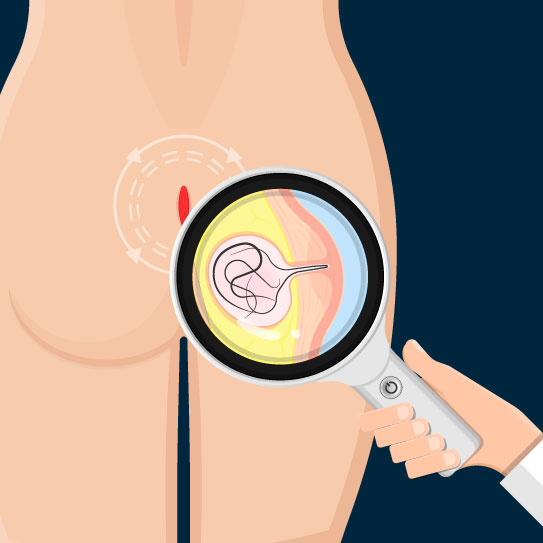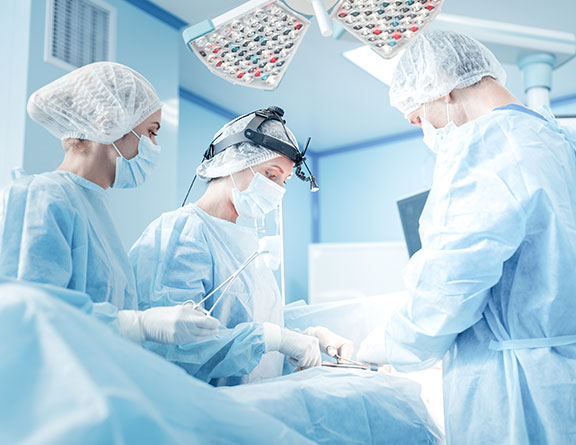Diet and Instructions for patients with Pilonidal Sinus
- Avoid sitting or standing continuously for long hours.
- Adopt a physically active lifestyle
- Add fenugreek herb to the diet, it helps with inflammation
- Add garlic, its antibiotic and antifungal properties are helpful as well
- Daily drink a teaspoon of honey in warm water
- Turmeric in food, its anti-inflammatory benefits are good too
- Take two teaspoons of apple cider vinegar daily
Advanced Laser Ablation Pilonidal Sinus Treatment in Alleppey
The latest and most promising treatment for pilonidal sinus is performed by laser-based surgical devices. The advanced daycare treatment is now available at Pristyn Care in Alleppey. The pilonidal cyst treatment specialist at Pristyn Care uses a laser-based surgical device to coagulate the abscess and any sinus tracts leading to it. The laser energy closes and seals these spaces without harming the surrounding tissue. The cyst is taken out from a small opening, afterward, the laser coagulates the tissue to seal it. The entire treatment. This makes it the best treatment for pilonidal cysts in Alleppey.
Specialists at Pristyn Care hold years of experience and ample knowledge to perform daycare procedures successfully for the fast recovery of pilonidal sinus.
Different surgical treatments for pilonidal sinus
Here are the different surgical treatments for pilonidal sinus treatment:
- Laser pilonidal sinus treatment– Laser surgery for pilonidal sinus is the most effective treatment for pilonidal sinus. During the procedure, the proctologist uses a high-intensity laser beam to close off the sinus tract. The doctor removes the entire pit of the pilonidal sinus so that the infection does not recur. It is an easier and higher precision procedure to perform as compared to the earlier mentioned types of open surgery. The treatment procedure requires only one day of dressing as there are minimally invasive left behind to heal. The laser energy also promotes the faster healing of the site of the surgery. Thus, it takes a very short time to recover from laser surgery for the pilonidal sinus completely.
- Incision and drainage– Incision and drainage is an open surgical procedure recommended mostly when the cyst becomes infected. It is performed with local anesthesia to make the affected area numb. The surgeon makes an incision in the cyst to drain the infectious fluid and pus. The doctor packs the hole with gauze and leaves it open to heal. It can take up to 4-6 weeks to heal the cyst completely.
- Pilonidal cystectomy– Pilonidal cystectomy is the surgical removal of the entire pilonidal cyst. The treatment is performed after administering general/regional anesthesia. The surgeon makes a cut to remove the affected skin along with underlying hair follicles, tissues, and dead cells. If required, the doctor packs the area with surgical gauze. In cases where the infection is severe, the doctor places a tube to drain the fluid from the cyst. The tube is removed when the entire fluid is drained from the cyst.
Are there any risks and complications involved during pilonidal sinus surgery?
If performed under the guidance and supervision of a trained proctologist, surgical treatment for pilonidal sinus will not cause any risks or complications. But, like any other surgery, there might be some complications, although not severe. Some of them are:
- Trauma and bleeding to the site – If the surgery is not performed efficiently, there can be a chance of the anal tissues getting injured. Trauma and injury to the anal tissues can even lead to bleeding. If the surgery is performed by an experienced surgeon, the chances of any injury can be cut down drastically.
- Infection – Like any other surgery, infection is a common side effect/ complication in case of pilonidal sinus surgery too. Infection can lead to nausea and vomiting in the person. Infection, however, is not a very serious problem and can be treated with medicines. The chances of infection in case of open surgery is much higher than in laser surgery.
- Squamous cell carcinoma – A type of skin cancer that occurs due to uncontrolled growth of the squamous cells. The condition is not very common but not unheard of. To prevent such complications, it is extremely important that an experienced and trained surgeon performs the surgery.







.svg)









